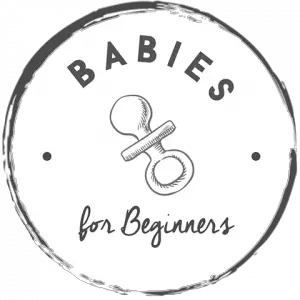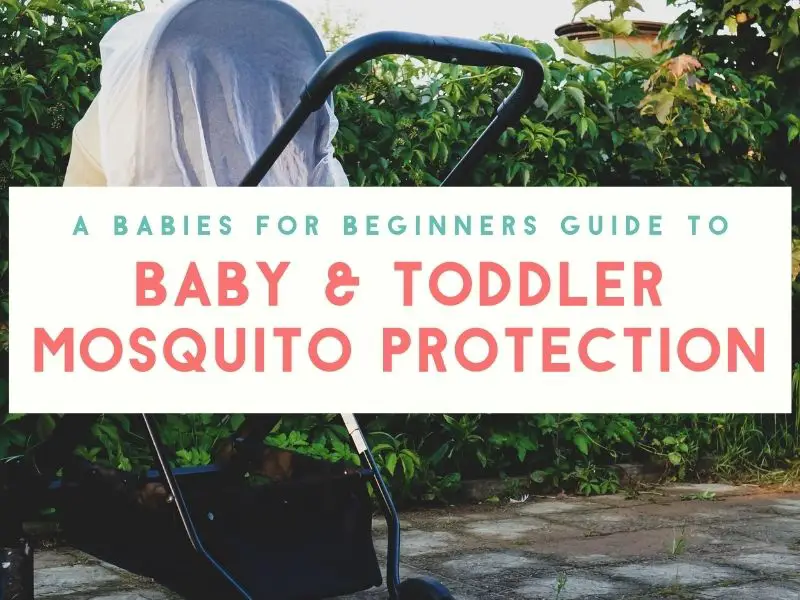Mosquitoes are a menace to both adults and children but they seem to be especially attracted to babies because of their warmth and lack of mobility.
Mosquitos aren’t just annoying, they can be dangerous. Mosquitos carry deadly diseases such as malaria, dengue fever, West Nile virus, and others.
Thankfully, there are steps you can take to keep mosquitoes away from your baby. This list includes repellents but also many non-chemical deterrents. We’re going to outline them all here, so keep reading.
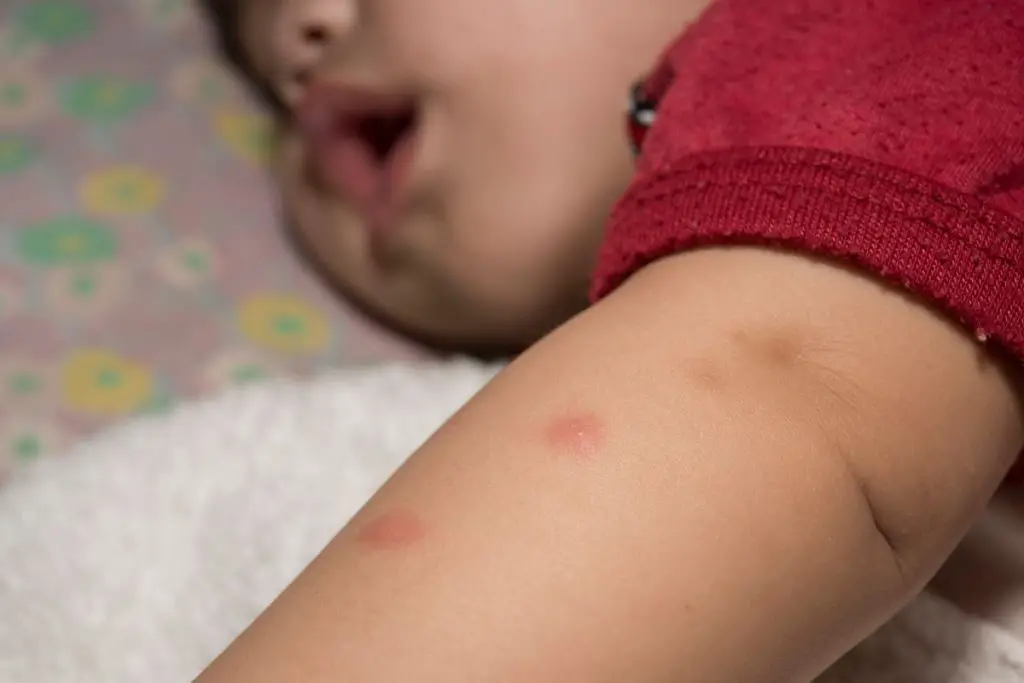
1) Use Protective Clothing
A good way to keep mosquitoes away from your baby or toddler while out and about is by dressing them in loose clothing including long sleeves, a hat, and long pants tucked into their socks. Making sure they are dressed in light colors is also a good idea because dark clothing attracts mosquitos.
If the weather is warmer and your kiddo is a bit older, a mesh face/body protector may be the perfect solution to let them enjoy the outdoors and avoid being bitten. These suits are lightweight and very breathable, and keep the bugs off your kiddo’s skin completely.
Pro-Parent Tip for Protective Face Mesh: As someone who has had two girls freak out in these suits, my number one must-do tip for these mesh suits is to use them with a stiff-brimmed hat like a baseball hat.
Toddlers HATE the feeling of these suits draped against their face and will throw a tantrum over wearing one without a hat keeping it at a distance from their face. DO NOT forget the hat with these!
Here is a mesh suit very similar to the kind my girls used that I found on Amazon (though it’s actually cheaper than the ones I bought in the big outdoor shops), to give you an idea of what you’re looking for. It comes in several sizes starting from size 2-3:
2) Use Mosquito Netting with Strollers, Playpens, Etc.
If your walking with your baby in a stroller or car seat, or if you’re baby will be placed in a playpen or other playspace, covering it with mosquito netting will keep them safe from bites.
Mosquito nets are the easiest and safest way to cover an infant in a stroller or car seat, as it doesn’t touch their skin and of course, they contain no chemicals.
Dressing your baby in their regular summer clothing and then protecting them with that mesh is also a cooler option for hotter days.
Pro-Parent Tip for Stroller/Playpen Mesh: Solar mesh covers, like this one from Jolly Jumper I used with my various types of strollers for years, can also do double duty, protecting your baby from the sun and heat, while also keeping bugs away.
Here are a few options to consider if you think this might be a good option for your needs:
3) Avoid The Worst Areas (if Possible)
One way that you can keep mosquitoes away from your infant is by keeping your baby or toddler out of areas where there are lots of mosquitoes, like near stagnant water sources, or in brush-covered forests.
Of course, this may be difficult if you live in a swampy area or if you’re enjoying a trek in the woods.
If possible though, keep your baby away from these potential mosquito havens and opt for less marshy areas and open spaces where the heat and wind naturally keep the mosquitos away.
Timing your outing can also help. Mosquitos are most active around dusk and around dawn. If possible, try to start your excursion well after dawn and come back inside before the sun starts to set.
Depending on the weather, this saves you from encountering any mosquitos at all as you’ll only be out when it’s too hot and dry for them to fly around looking for food.
4) Clear Standing Water and Leaves
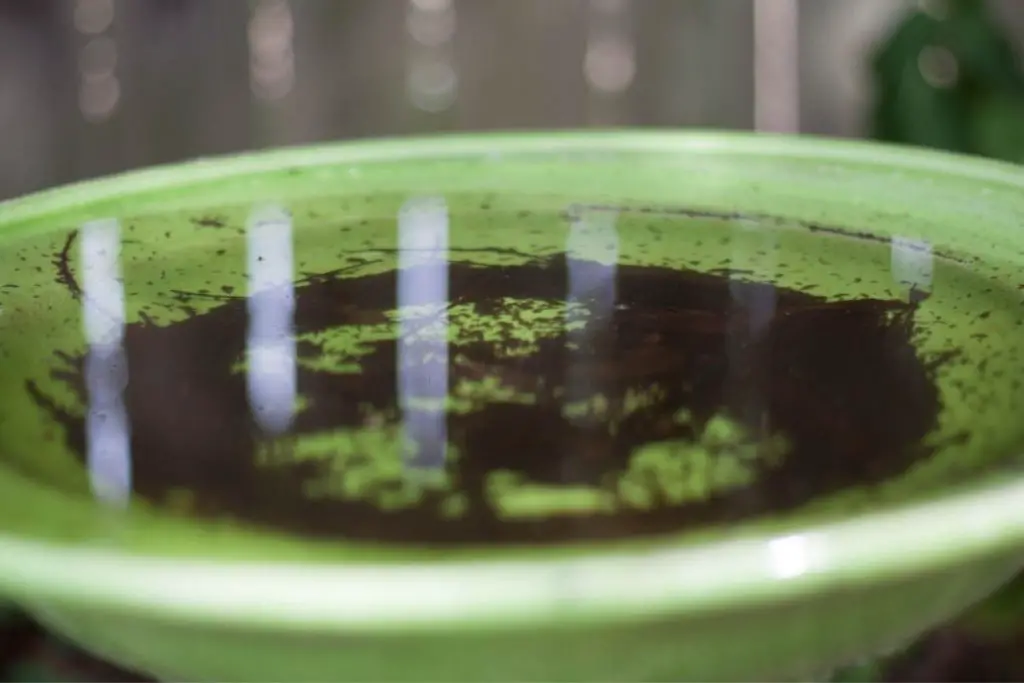
If you live in an area where mosquitos are a problem, make sure to keep your property as clear of standing water as possible because mosquitoes will be drawn to it like a magnet for breeding.
“Standing water” is any water that is still in one place for an extended period of time. Emptying that water, or using pond pumps to keep the water moving, is the best way to keep mosquitos from multiplying on your property. This includes:
- Pet dishes,
- open containers, like buckets that are left unattended outside,
- birdbaths,
- kiddy pools, and
- garden ponds.
Mosquitos can also breed in piles of wet leaves and other plant material, so clearing these piles can also help.
5) Apply an Insect Repellent
Repellents don’t kill the mosquitos, they work by making humans less appealing to them. By applying a repellent lightly on your little one’s exposed skin you can drastically reduce the number of bugs that bite them or even come around looking for a meal.
Of course, there are many kinds of insect repellents out there, and it’s natural you’d be wondering which one is safe for your baby or toddler. The best place to start is the label, where you can see what kind of active ingredient it uses.
The most common ingredient in mosquito repellents is DEET, so let’s take a look at that one first.
What’s the Deal With DEET, is it Safe for Babies?
DEET (N, N-Diethyl-meta-toluamid) is a chemical used in many popular insect repellents. If you’re a camper like I am, you’ll know repellents containing DEET are some of the most effective at keeping mosquitos away and have been proven effective for long periods of time. In fact, the higher the concentration, the longer the duration of effectiveness. For example, 10% DEET repellents are effective for about three hours, and a solution of 23.8% DEET provides about five hours of protection from mosquitoes. (HealthLinkBC, 2020)
But as a new parent, you’re probably asking yourself, is DEET is safe for babies? According to the American Academy of Pediatrics (APA, 2013), DEET can be used on babies over three months of age. Canada, where I live is a bit stricter; according to Health Canada, DEET products are only safe for children aged 6 months and up. Health Canada recommends infants younger than 6 months old, do not use an insect repellent containing DEET, and should instead be protected with a mosquito net when outdoors in a crib or stroller (Health Canada, 2020).
The next question you’ll probably ask is, what percent of DEET is safe for babies? The AAP recommends that repellents should contain no more than 30% DEET when used on children (AAP News, 2013).
In Canada, Health Canada outlines the safest concentrations of DEET to use on children by age. Specifically:
- adults and children older than 12 years old is up to 30%
- children aged 2 to 12 years is up to 10%
- you can apply the product up to 3 times daily
- children aged 6 months to 2 years old is up to 10%
- you should not apply the product more than once a day
Health Canada goes on to say that children younger than 12 years old, should not use a DEET product on a daily basis for more than a month (Health Canada, 2020).
With that said, all sources agree that for all children DEET should not be applied more than once a day and should be washed off with soap and water when you come inside to avoid toxicity.
Important Point: Products combining DEET and Sunscreen for children are not considered safe. The APA explains this is because sunscreen usually should be reapplied more often than insect repellent. (APA, 2013)
What is Icaridin, and is it a Safe Alternative?
Icaridin is another product that can repel mosquitoes and ticks safely. According to the AAP, “Picaridin, or icaridin is a plant-derived piperidine compound that is effective against mosquitos, ticks, chiggers and flies…. This ingredient is odorless, non-sticky, non-greasy and better tolerated on the skin than DEET.” (AAP News, 2013)
Icaridin is available in concentrations of 5%-20%. The AAP recommends using products with up to 10% picaridin, but does not recommend using it on children younger than 2 months old.
Health Canada is once again more cautious, stating that icaridin products should not be used on infants younger than 6 months old (Health Canada, 2020).
P-Menthane-3,8-diol
Once again looking to Health Canada, which has the most extensive list of mosquito repellent ingredients, products with p-Menthane-3,8-diol or oil of lemon eucalyptus, hydrated, cyclized repel mosquitoes. Unfortunately, these products also should not be used on children younger than 3 years old.
This ingredient highlights how important it is to read labels as some big brand products, like Off! Botanicals use this ingredient.
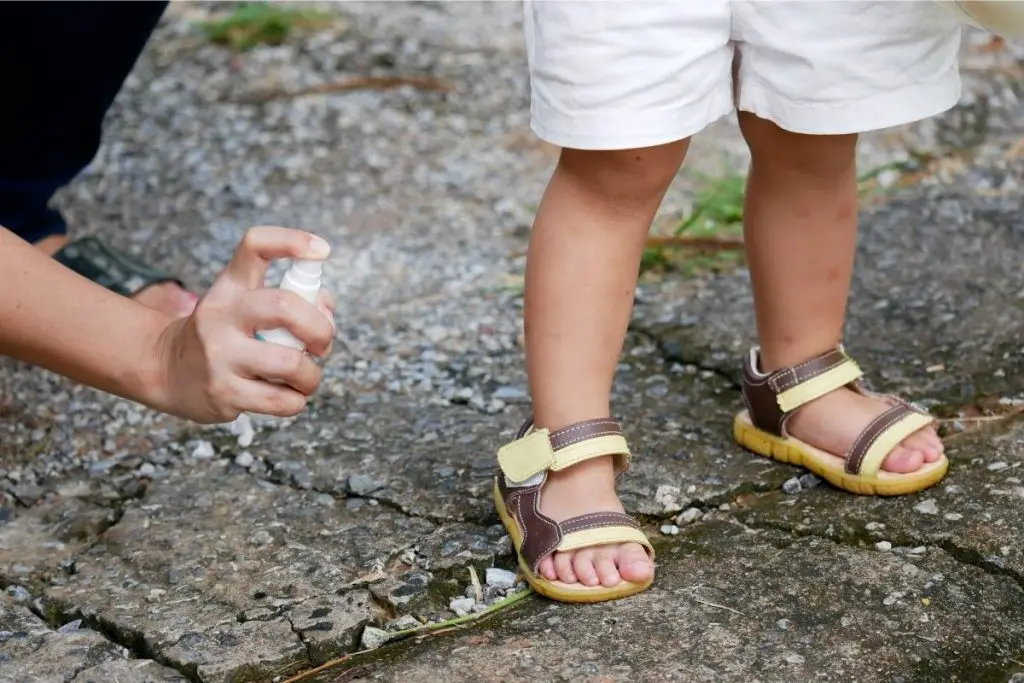
Are Essential Oil Repellents Safe?
I’ve been the mom putting citronella essential oil on my daughers’ hats in hopes of keeping the mosquitos away, only to watch them get bit.
While new parents might turn to essential oils as a “natural” or safer alternative to DEET and Icaridin, some of these products can be more harmful than helpful and aren’t recommended by most sources.
According to Health Canada, citronella products should not be used on infants and toddlers. It also mentions that insect repellents containing a mixture of lemon, eucalyptus, pine needle, geranium and/or camphor essential oils can be used safely when applied as directed but should not be used on children younger than 2 years old. (Health Canada, 2020).
What About Soybean Oil to Repel Mosquitos?
One “natural” alternative that works, a bit anyway, is soybean oil. According to the Canadian Pediatric Society Products with 2% soybean oil can provide protection for 3.5 hours against mosquitoes (and up to 8 hours against black flies). There are also no age restrictions or limitations on the frequency of use.
I would caution you though that putting any oil on your baby’s skin should be done with caution as it could lead to sunburn.
Other “Repellent” Products That DO NOT Work Well
There are other products advertised as mosquito repellents that don’t effectively prevent mosquito bites. These include:
- Wrist, ankle, and neck bands that contain repellents, such as DEET or citronella,
- Avon Skin So Soft (without icaridin) ,
- “Ultrasonic” or “sonic” devices or smartphone apps,
- Clip-on fan devices,
- Bug zappers or other electrocuting devices,
- Odour-bated mosquito traps,
- Geranium plants,
- Citronella candles and coils, and
- Thiamine (vitamin B1) supplements.
List of Popular Mosquito Repellents Considered Safe and Effective By the APA and Health Canada
| Product Name & Amazon Link | Repellent Ingredients Used | Safe For Ages |
|---|---|---|
| OFF! Family Care Insect & Mosquito Repellent, Unscented | 7% DEET | Six months and up |
| Cutter Skinsations Insect Repellent | 7% DEET | Six months and up |
| Skin So Soft Bug Guard + Picaridin Towelettes | 10% PICARIDIN | Six months and up |
| AVON Skin SO Soft Bug Gaurd Plus Picaridin | 10% PICARIDIN | Six months and up |
| Swamp Gator Natural Insect Repellent | Geraniol, Soybean Oil, Rosemary Oil, Pappermint Oil, Geranium Oil | Two Years Old and up |
How to Use Insect Repellents Safely
- Apply it to healthy skin only, never to irritated or sunburned areas
- Do not use it under clothes
- Apply it in well-ventilated areas
- Don’t apply it on children’s hands, mouth, or eye area (to avoid ingestion or irritation)
- When applying it to a child’s face, don’t spray it directly, spray it on your hands and rub it onto the child’s face
- Wash repellent off with soap and water after returning home
Important Note: This article is for information purposes only and individual needs should always be taken into account. When in doubt, consult your pediatrician.
References
Repellents Part of Arsenal in War Against Insects. (2013, June). AAP (American Academy of Pediatrics) News. Volume 24, Number 6. Retrieved May 15 from: https://www.aappublications.org/content/34/6/16.1
Insect repellents. (2020, July 20). HealthLink BC. Retrieved May 15 from: https://www.healthlinkbc.ca/health-topics/uf4815
Insect repellents. (2020, July 6). Health Canada. Retrieved May 15 from: https://www.canada.ca/en/health-canada/services/about-pesticides/insect-repellents.html
Preventing mosquito and tick bites: A Canadian update. (Updated 2021, Feb 2). The Canadian Paediatric Society. Retrieved May 15 from: https://www.cps.ca/en/documents/position/preventing-mosquito-and-tick-bites#ref1
Safe use of insect repellents can minimize itching, scratching. (2013). American Academy of Pediatrics. Retrieved May 15 from: https://www.aappublications.org/content/34/6/16.2
